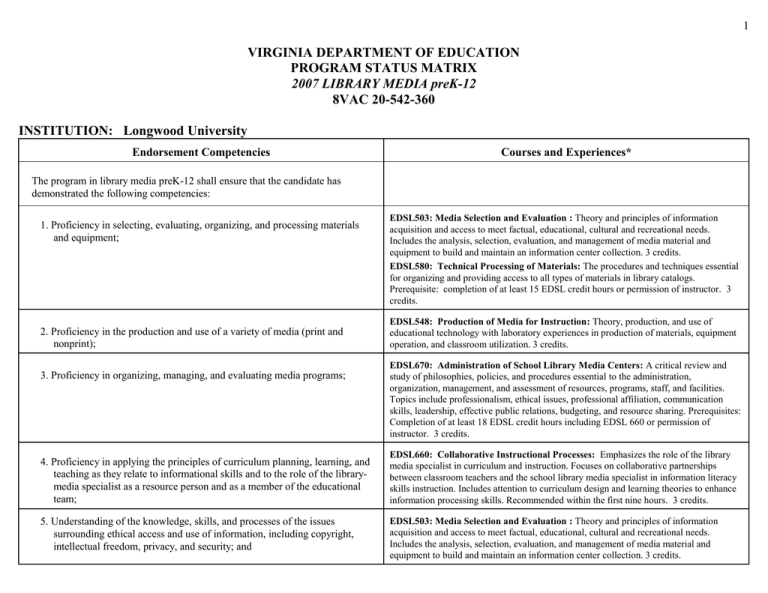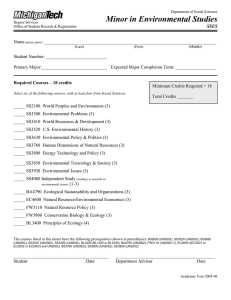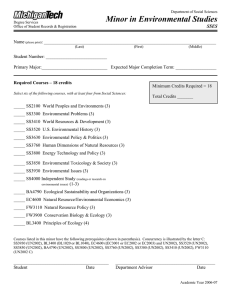VIRGINIA DEPARTMENT OF EDUCATION PROGRAM STATUS MATRIX 8VAC 20-542-360
advertisement

1 VIRGINIA DEPARTMENT OF EDUCATION PROGRAM STATUS MATRIX 2007 LIBRARY MEDIA preK-12 8VAC 20-542-360 INSTITUTION: Longwood University Endorsement Competencies Courses and Experiences* The program in library media preK-12 shall ensure that the candidate has demonstrated the following competencies: 1. Proficiency in selecting, evaluating, organizing, and processing materials and equipment; 2. Proficiency in the production and use of a variety of media (print and nonprint); 3. Proficiency in organizing, managing, and evaluating media programs; EDSL503: Media Selection and Evaluation : Theory and principles of information acquisition and access to meet factual, educational, cultural and recreational needs. Includes the analysis, selection, evaluation, and management of media material and equipment to build and maintain an information center collection. 3 credits. EDSL580: Technical Processing of Materials: The procedures and techniques essential for organizing and providing access to all types of materials in library catalogs. Prerequisite: completion of at least 15 EDSL credit hours or permission of instructor. 3 credits. EDSL548: Production of Media for Instruction: Theory, production, and use of educational technology with laboratory experiences in production of materials, equipment operation, and classroom utilization. 3 credits. EDSL670: Administration of School Library Media Centers: A critical review and study of philosophies, policies, and procedures essential to the administration, organization, management, and assessment of resources, programs, staff, and facilities. Topics include professionalism, ethical issues, professional affiliation, communication skills, leadership, effective public relations, budgeting, and resource sharing. Prerequisites: Completion of at least 18 EDSL credit hours including EDSL 660 or permission of instructor. 3 credits. 4. Proficiency in applying the principles of curriculum planning, learning, and teaching as they relate to informational skills and to the role of the librarymedia specialist as a resource person and as a member of the educational team; EDSL660: Collaborative Instructional Processes: Emphasizes the role of the library media specialist in curriculum and instruction. Focuses on collaborative partnerships between classroom teachers and the school library media specialist in information literacy skills instruction. Includes attention to curriculum design and learning theories to enhance information processing skills. Recommended within the first nine hours. 3 credits. 5. Understanding of the knowledge, skills, and processes of the issues surrounding ethical access and use of information, including copyright, intellectual freedom, privacy, and security; and EDSL503: Media Selection and Evaluation : Theory and principles of information acquisition and access to meet factual, educational, cultural and recreational needs. Includes the analysis, selection, evaluation, and management of media material and equipment to build and maintain an information center collection. 3 credits. 2 EDSL560: Informational Sources and Services: The philosophy, policies, and skills necessary for providing information access skills to students, including bibliographic instruction and reference services. 3 credits. EDSL670: Administration of School Library Media Centers: A critical review and study of philosophies, policies, and procedures essential to the administration, organization, management, and assessment of resources, programs, staff, and facilities. Topics include professionalism, ethical issues, professional affiliation, communication skills, leadership, effective public relations, budgeting, and resource sharing. Prerequisites: Completion of at least 18 EDSL credit hours including EDSL 660 or permission of instructor. 3 credits. 6. Understanding of and proficiency in grammar, usage, and mechanics and their integration in writing. EDSL503: Media Selection and Evaluation : Theory and principles of information acquisition and access to meet factual, educational, cultural and recreational needs. Includes the analysis, selection, evaluation, and management of media material and equipment to build and maintain an information center collection. 3 credits. EDSL548: Production of Media for Instruction: Theory, production, and use of educational technology with laboratory experiences in production of materials, equipment operation, and classroom utilization. 3 credits. EDSL560: Informational Sources and Services EDSL560: Informational Sources and Services: The philosophy, policies, and skills necessary for providing information access skills to students, including bibliographic instruction and reference services. 3 credits. EDSL580: Technical Processing of Materials: The procedures and techniques essential for organizing and providing access to all types of materials in library catalogs. Prerequisite: completion of at least 15 EDSL credit hours or permission of instructor. 3 credits. EDSL660: Collaborative Instructional Processes: Emphasizes the role of the library media specialist in curriculum and instruction. Focuses on collaborative partnerships between classroom teachers and the school library media specialist in information literacy skills instruction. Includes attention to curriculum design and learning theories to enhance information processing skills. Recommended within the first nine hours. 3 credits. EDSL670: Administration of School Library Media Centers: A critical review and study of philosophies, policies, and procedures essential to the administration, organization, management, and assessment of resources, programs, staff, and facilities. Topics include professionalism, ethical issues, professional affiliation, communication skills, leadership, effective public relations, budgeting, and resource sharing. Prerequisites: Completion of at least 18 EDSL credit hours including EDSL 660 or permission of instructor. 3 credits. *NOTE: Course descriptions are taken from the Longwood Graduate Catalog 2008-2009 available at http://www.longwood.edu/graduatestudies/catalog2008/Courses.htm * Description of what the institution offers to enable students to develop the knowledge and skills identified in the competency. When citing courses, provide course number, title, and catalog description. Catalog descriptions and syllabi may be attached.



